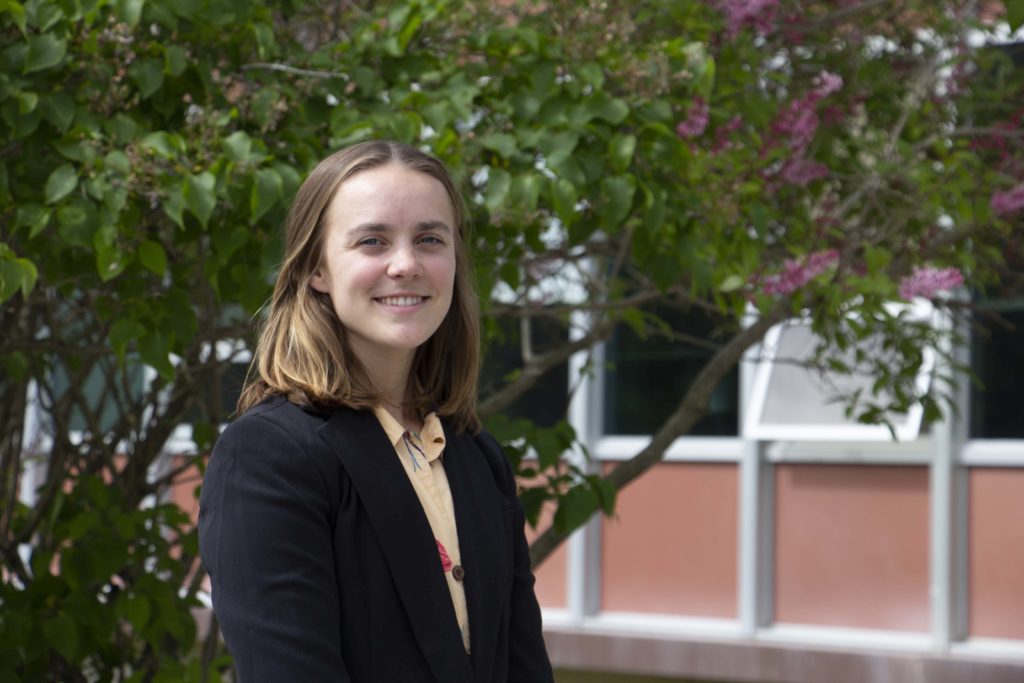 Monica Keim, a rising junior at APU, is one of 15 students nationwide receiving a two-year federal scholarship through the 2020 José E. Serrano Educational Partnership Program with Minority Serving Institutions (or EPP/MSI), funded by the National Oceanic and Atmospheric Administration (NOAA) Office of Education
Monica Keim, a rising junior at APU, is one of 15 students nationwide receiving a two-year federal scholarship through the 2020 José E. Serrano Educational Partnership Program with Minority Serving Institutions (or EPP/MSI), funded by the National Oceanic and Atmospheric Administration (NOAA) Office of Education
EPP/MSI supports students from minority backgrounds as they pursue careers in climate, weather, ocean and coastal science. The program is designed to provide underrepresented students with opportunities and career connections at NOAA and its partners; as an Alaska Native-serving institution, all APU students are now eligible for the scholarship (valued up to $45,000) during their junior and senior years.
Monica is a marine and environmental sciences major with a focus in fisheries ecology (plus a minor in environmental policy and a certificate in water resource management). EPP/MSI, she said, is “a jump start on my career.”
She first learned of undergraduate opportunities with NOAA while working in Homer last summer. Her supervisor – Mike Booz of the Alaska Department of Fish & Game, who frequently visits APU classrooms to discuss careers in fisheries – encouraged Monica to apply for NOAA programs, citing the opportunities for networking and research. He also pointed out the host of NOAA interns working each summer at Homer’s Kachemak Bay National Estuary Research Reserve.
Now, Monica is one of those interns. In a typical year, she and her fellow EPP/MSI scholars would meet for summer internships at NOAA’s headquarters in Silver Spring, Maryland. But this year, of course, is not a typical year. Instead, NOAA allowed the 2020 cohort to launch into individual internships across the country. Monica found an opportunity combining her interests in policy, management, and field research with a NOAA Fisheries office in Portland, Oregon. Her summer project in the Protected Resources Division – which covers endangered marine and anadromous species – will assess the challenges of measuring successful salmon recovery, in partnership with grantees from the Pacific Coast Salmon Recovery Fund.
But the summer internship is just the first step in her two years as an EPP/MSI scholar. She will present her summer work at a virtual symposium this July (the conference is typically held in-person in Maryland). Once the school year starts, Monica will research and apply for conferences (NOAA covers flights, as well as conference costs if a scholar is selected to present). She plans to assist Dr. Erin Larson during the school year at APU, and will complete a local service or outreach project during her senior year.
Most importantly, though, Monica can now connect with NOAA staff, find mentors, and build her own project for summer 2021. “A lot of people use it as an opportunity to come to Alaska,” she said (a few members of her cohort have already asked her about working in the North next summer). But internships can take place anywhere in NOAA’s vast research realm, from the coast of Maine to the field station in American Samoa.
“They want to connect you to whatever kind of career you want,” Monica said of the EPP/MSI program. “It’s honestly tailored to the student. Whatever you want to focus on in your career, you can find it.”
Through her two years as a scholar, Monica will gain experience networking with scientists, presenting at conferences, and working on research typically reserved for grad school and career professionals.
Although the pandemic redirected her experience so far, the most central element of the EPP/MSI opportunity hasn’t changed: this experience is certainly a jump start for her career.
Interested students can learn more about the scholarship program at NOAA’s website. Students can also ask Monica questions about the experience at mkeim@alaskapacific.edu.
